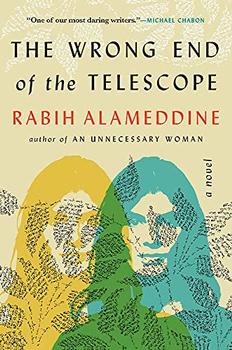Summary | Excerpt | Reviews | Beyond the Book | Readalikes | Genres & Themes | Author Bio

I bought them five. I had to. The Greek owner, a woman in her forties, suggested that I shouldn't have because they'd had too much sugar. She'd given them each a bar that morning, free of charge, after which they began to persuade her customers to buy them more. She'd lost count of how many bars they'd devoured. The little tricksters preened. I expected to find canary feathers stuck to the chocolate smears around their lips. When I asked the Iraqi girl how many chocolate bars she'd had, she put up four fingers.
Immediately within the gate to the refugee camp across the road was a large police van, its motor idling, its color a blue so gloomy as to be almost black. I couldn't look at anything else for a minute. It was a beacon of dark in the light, a big blob of bad color. The kids, still savoring the chocolate, stood on either side of me looking at the same van. They were so big, one of the boys said, pointing at three policemen in full riot gear smoking beside the van, helmets off to make it easier for cigarettes to couple with lips. They had not laid their polycarbonate riot shields down. Big boys with machine guns, batons, vests, neck protectors, knee pads—yes, body armor made your ass look fat. They didn't speak English, another boy said, or Arabic. They didn't talk except to each other. The cinder block wall next to the gate shouted defiantly: NO BORDERS NO NATIONS in red graffiti.
I told the children that I could go in by myself; they did not have to be my guides. But they insisted. I needed them, they said. And we had made a deal. Once more they held my hands and led me across the road. The camp was contained by high concrete walls and chain-link fencing, all capped with concertina razor wire, giving it the air of a high-security prison gone awry because there were hundreds of pup tents in the olive grove outside. There wasn't enough space inside, the boy leader said. There were more refugees outside the camp than inside. The Pakistani boy slept with his family in a tent in another olive grove on the far side of the camp. The boy leader told the Pakistani boy that we were talking about him, before turning back to me and complaining that they couldn't understand each other and that created a strain in their relationship. One of the Syrian boys told me that his family had to sleep in the open air the first night because they couldn't afford to buy a tent, which was bad because of the cold and lots of ants, but they were moved into the camp barracks the second night, and they were going to Athens on a boat tomorrow, so everything was all right. They explained that all of them would be leaving within a week or two except for the Pakistani boy, and they weren't sure how he could survive without them.
Slight rain welcomed us as soon as we entered the gate, slight enough that the children hardly seemed to notice it. The three policemen didn't seem to notice either the rain or us; Cerberus they weren't. These were policemen, the boys said. This was a van, this building was for camp administrators, and they had their own bathrooms. These families were going to the bus that would take them to the ferry that would take them to Athens and then by train to Europe proper. The ship to Athens was huge and was completely safe.
Excerpted from The Wrong End of the Telescope© 2021 Rabih Alameddine. Reprinted with permission of the publisher, Grove Press, an imprint of Grove Atlantic, Inc. All rights reserved.
Your guide toexceptional books
BookBrowse seeks out and recommends the best in contemporary fiction and nonfiction—books that not only engage and entertain but also deepen our understanding of ourselves and the world around us.